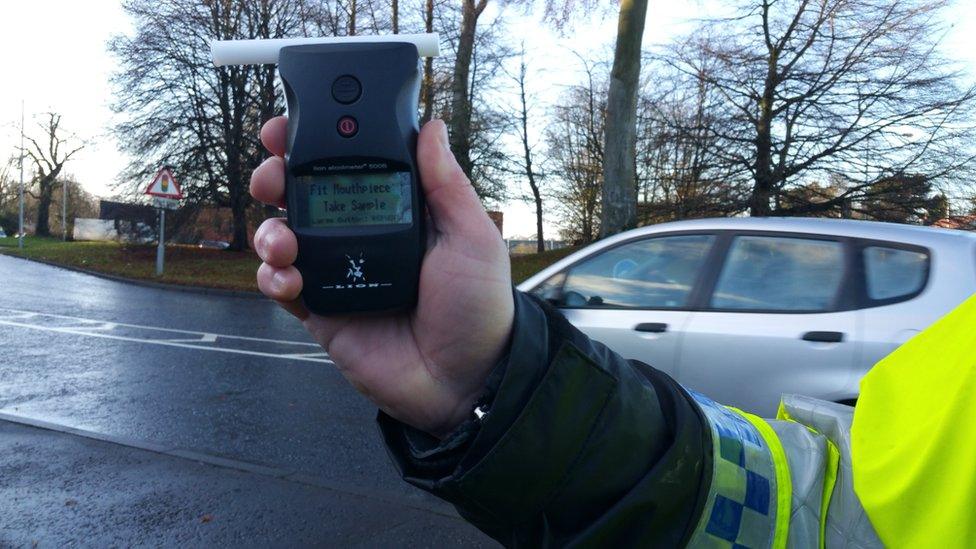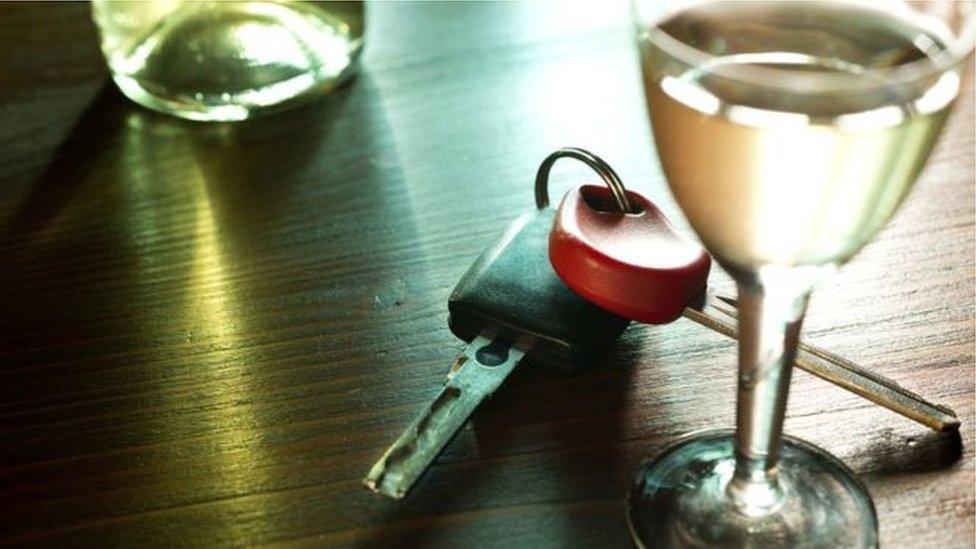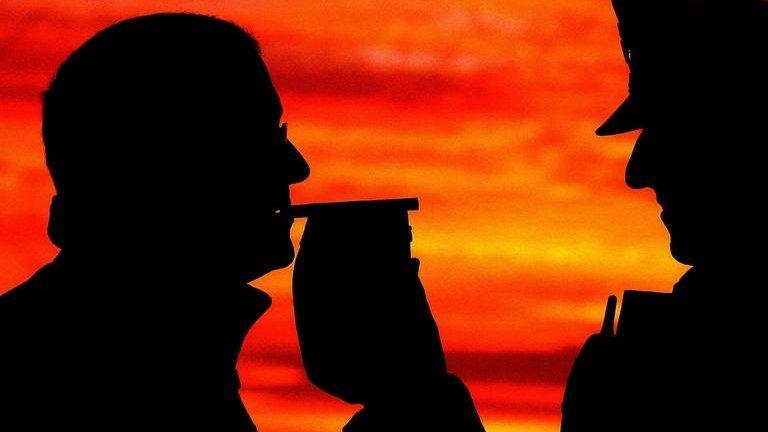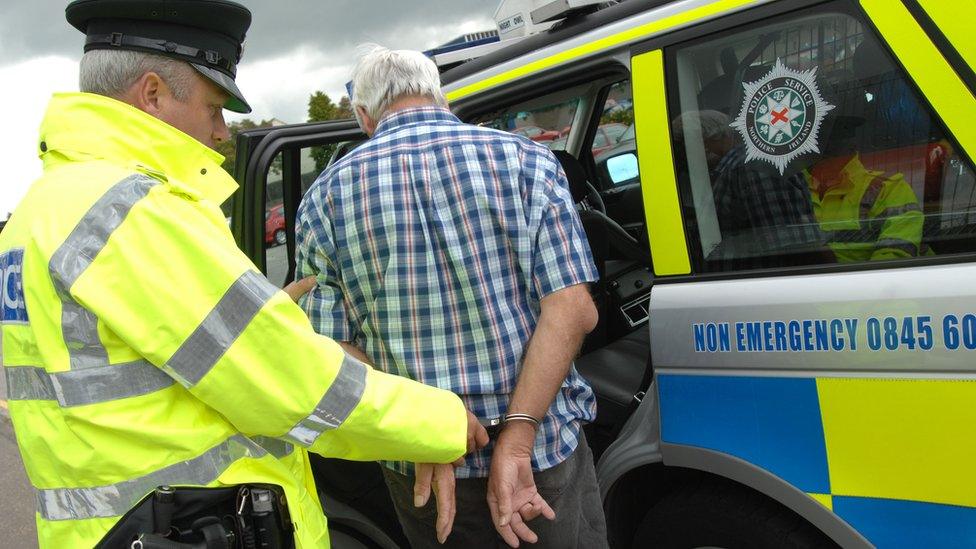New breathalyser equipment delayed for more than two years
- Published

The PSNI cannot fully enforce tougher drink-driving laws introduced almost three years ago as they do not have breathalysers capable of testing lower blood alcohol levels.
New drink-driving legislation was passed in the assembly in April 2016. , external
It lowered the drink-drive limits to 22 micrograms of alcohol per 100ml of breath for standard drivers.
That's a reduction of almost 40% on the current levels of 35 micrograms per 100ml of breath.
It also introduced an even lower limit of nine micrograms per 100ml of breath for learner and novice drivers - those within two years of passing their test - as well as some professional drivers.
Delay
However, the PSNI does not have access to breathalysers capable of accurately testing drivers for the new lowest limit.
A Stormont department first reported a delay, external in the arrival of the breath tests in January 2017.
At the time, a Department for Infrastructure official expressed concern that "it could be 12 months" before the new devices were authorised by the Home Office - which is responsible for overseeing the approval process of road traffic enforcement equipment.

It was confirmed that current police equipment is 'not suitable' for testing the new lower drink-driving limits
However, almost two years after that committee meeting, no manufacturer has produced roadside breathalysers capable of testing the lowest levels of nine micrograms.
In a statement, the PSNI said: "A new testing process has been taken forward by the Home Office, with manufacturers encouraged to participate in the production of new breath-testing equipment."
The Home Office told the BBC: "It is for manufacturers to market their device and the police to decide when to procure.
"The Home Office only approves equipment for police use and do not have any involvement in decisions about lowering drink-drive limits."

What is the law?
Currently, the law allows for up to 35 micrograms of alcohol in 100 millilitres of breath, external, or 80 milligrammes of alcohol in 100 millilitres of blood.
The new laws, external, passed in April 2016, lower the limits by almost 40% - to 22 micrograms and 50 milligrammes respectively.
These limits are lower than those enforced in England and Wales, but in line with those in Scotland.

A Parliamentary Advisory Council for Transport Safety (PACTS) report, external, published in October 2017, said implementing the bill's reforms had been delayed in Northern Ireland, subject to "achieving type approval for equipment that can test for these lower BAC levels".
It is understood police in Scotland were able to implement new lower limits introduced there in 2014 because the Scottish Assembly did not introduce a separate lower limit for learner, novice and professional drivers.
Currently, no roadside breathalysers capable of testing such low levels are available anywhere in the UK.
On Friday, PACTS announced that it had been awarded a grant by the Secretary of State for Transport to run a competition to encourage the development of mobile evidential breath-testing instruments, external which meet Home Office type approval requirements.
Manufacturers could be awarded up to £350k of a grant to produce such equipment.
A PACT spokesperson said it hopes such breathalysers could reliably test Northern Ireland's very lowest levels at the roadside.
However, the instruments are unlikely to be in circulation before June 2020.
Concern
John Blair, a member of the Policing Board and Alliance MLA, expressed concern about the delay.
"We must ensure the PSNI is using the most up-to-date equipment and any ambiguity around this is not acceptable," he told the BBC.
"Not only is this yet another item to add to the list of outstanding issues for the newly reconstituted Policing Board, but again demonstrates how the lack of an executive is damaging Northern Ireland.
"Clearly this issue will be best addressed with a justice minister in place, working alongside the Policing Board and other relevant bodies to press the Home Office for change."
Meanwhile, the PSNI said on Thursday that it had arrested 151 drivers and motorcyclists in the first two weeks of this year's winter anti-drink drive operation.
It added that this was "three less than during the first two weeks of last year's operation".
The PSNI said that in addition to continuing its "authorised vehicle checkpoints and random breath tests, any driver or motorcyclist stopped by police, whether for speeding, using a mobile phone, or committing any moving traffic offence will be breathalysed".
"As will anyone involved in a collision or who we suspect may have consumed alcohol or taken drugs," a PSNI spokesperson added.
- Published12 May 2014

- Published26 September 2011
- Published21 December 2016
